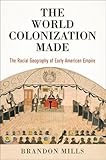The World Colonization Made : The Racial Geography of Early American Empire / Brandon Mills.
Material type: TextSeries: Early American StudiesPublisher: Philadelphia : University of Pennsylvania Press, [2020]Copyright date: ©2021Description: 1 online resource (288 p.) : 7 illusContent type:
TextSeries: Early American StudiesPublisher: Philadelphia : University of Pennsylvania Press, [2020]Copyright date: ©2021Description: 1 online resource (288 p.) : 7 illusContent type: - 9780812297324
- online - DeGruyter
| Item type | Current library | Call number | URL | Status | Notes | Barcode | |
|---|---|---|---|---|---|---|---|
 eBook
eBook
|
Biblioteca "Angelicum" Pont. Univ. S.Tommaso d'Aquino Nuvola online | online - DeGruyter (Browse shelf(Opens below)) | Online access | Not for loan (Accesso limitato) | Accesso per gli utenti autorizzati / Access for authorized users | (dgr)9780812297324 |
Frontmatter -- Contents -- Introduction. The World Colonization Made -- Chapter 1. A republic Once removed -- Chapter 2. Colonization doctrines -- Chapter 3. Colonization Policies in an age of removal -- Chapter 4. Settler republics in Black and White -- Chapter 5. The united States of Africa -- Chapter 6. Reimagining Colonization in the Americas -- Epilogue. The racial Geography of America’s imperial Future -- Notes -- Index -- Acknowledgments
restricted access online access with authorization star
http://purl.org/coar/access_right/c_16ec
According to accepted historical wisdom, the goal of the African Colonization Society (ACS), founded in 1816 to return freed slaves to Africa, was borne of desperation and illustrated just how intractable the problems of race and slavery had become in the nineteenth-century United States. But for Brandon Mills, the ACS was part of a much wider pattern of national and international expansion. Similar efforts on the part of the young nation to create, in Thomas Jefferson's words, an "empire of liberty," spanned Native removal, the annexation of Texas and California, filibustering campaigns in Latin America, and American missionary efforts in Hawaii, as well as the founding of Liberia in 1821. Mills contends that these diverse currents of U.S. expansionism were ideologically linked and together comprised a capacious colonization movement that both reflected and shaped a wide range of debates over race, settlement, citizenship, and empire in the early republic.The World Colonization Made chronicles the rise and fall of the colonization movement as a political force within the United States—from its roots in the crises of the Revolutionary era, to its peak with the creation of the ACS, to its ultimate decline with emancipation and the Civil War. The book interrogates broader issues of U.S. expansion, including the progression of federal Indian policy, the foundations and effects of the Monroe Doctrine and Manifest Destiny, and the growth of U.S. commercial and military power throughout the Western hemisphere. By contextualizing the colonization movement in this way, Mills shows how it enabled Americans to envision a world of self-governing republics that harmonized with racial politics at home.
Mode of access: Internet via World Wide Web.
In English.
Description based on online resource; title from PDF title page (publisher's Web site, viewed 01. Dez 2022)


